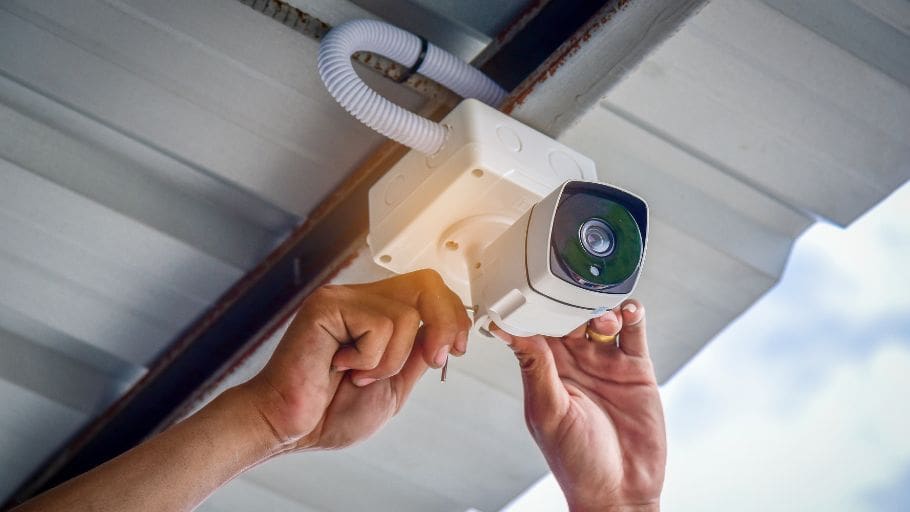Retail businesses face more unique challenges today when it comes to security. Threats are not only limited to physical damages and losses. With more people relying on digital transactions, online threats are ever-changing and can even be more damaging.
In this blog, we’ll discuss security strategies you can implement to safeguard your retail business. From offline to online, we’ve got you covered!

Physical Security
Plan store layout with security in mind
A well-designed store layout can do wonders for business growth. Customer experience can be improved by making it easier to find things they might like or need. You can boost sales by highlighting marketable or high-priced items. It can also improve your store’s security by deterring theft and intruders.
A good theft prevention strategy is reducing blind spots would-be thieves could exploit. You can do this by strategically placing shelves and installing mirrors between the aisles. This makes it easier for store employees to monitor customers and send alerts in case of emergencies. It’s also recommended to place higher-priced products near where employees can keep a close watch, preferably far from any exits.
Install surveillance and alarm systems
Ensuring complete visibility within a store is hard, and employees can’t keep an eye on everything at all times, so integrate surveillance and alarm systems in your store. Install security cameras near any entrances or exits, parking areas, and cashier stations. You can prop them up so they’re more visible and act as a deterrent. However, the more visible your cameras are, the easier they can be to avoid or destroy during a break-in.
For additional security, consider installing motion detectors with lights and alert systems to scare off potential intruders. Installing glass break sensors for windows and displays is also recommended.
Control access
Limit access to areas like stockrooms, offices, and surveillance rooms. Most stores have passcodes which can be easy to set up but also be easy to bypass. To enhance your store security, consider implementing key card systems or biometric scanners with secure locks to effectively control access and ensure that only authorised personnel can enter these areas.

Cybersecurity
Protect sensitive digital information with data encryption
As a retail business, customers often share sensitive information like their names, addresses, phone numbers, and credit card details. If this information falls into the wrong hands, it could damage your business and pose a threat to your customers’ personal security. Improve your digital security by implementing end-to-end data encryption.
Provide secure payment processing
One of the most common times that’s prone to data theft is during payment processing for digital wallets and cards. Vet third-party payment vendors. Perform comprehensive research on their background and customer feedback.
Perform checks and updates regularly
Don’t be complacent after installing cybersecurity measures. Stay vigilant and frequently check every software or security system to ensure it’s always up to date. This will help you detect abnormal activities, malware, and potential security breaches.

Employee Training
Train for identifying and preventing theft
Your employees are your greatest asset and, with proper training, can be very helpful in improving store security. Encourage vigilance and regular checks. Provide training on identifying suspicious behaviour, learning theft prevention strategies, and implementing store security policies.
Cyber threats can also target your employees so it’s important to provide comprehensive training on how to handle sensitive information, including customer data and payment details.
Perform regular audits
Besides regularly performing cybersecurity checks, it’s also important to perform regular audits on your store’s physical inventory. This helps ensure accurate stock levels and identify discrepancies early. Regular inventory checks are also a good theft prevention strategy by encouraging employees to be accountable.
Insurance
General Liability Insurance
Having General Liability Insurance provides added financial security by protecting your business against claims of personal injuries, property damage, or loss within store premises. For example, if a customer is pickpocketed inside your store or injured in the parking lot and then accuses the store of negligence, General Liability Insurance may help cover repair and legal costs.
Commercial Property Insurance
Commercial Property Insurance, like General Liability, can cover repair and legal costs. The difference is that it can provide coverage for losses directly suffered by the store from incidents like property damage, inventory theft, and equipment breakdown.
There are many factors and risks that you need to consider, so it’s best to speak with an insurance broker. You can contact East West Insurance Brokers to submit an inquiry and receive more information.
Business Interruption Insurance
Unforeseen circumstances and emergencies can cause significant financial damage to retail businesses, so Business Interruption Insurance is necessary. Depending on the coverage you include, it can cover loss of income, ongoing expenses during repairs, and even temporary relocation costs.
Secure your retail business with appropriate coverage
Want to find appropriate coverage for retail business insurance but don’t know where to start? Our East West Insurance Brokers team is ready to help you explore your options to protect your business. Get in touch and secure your future with us today!
